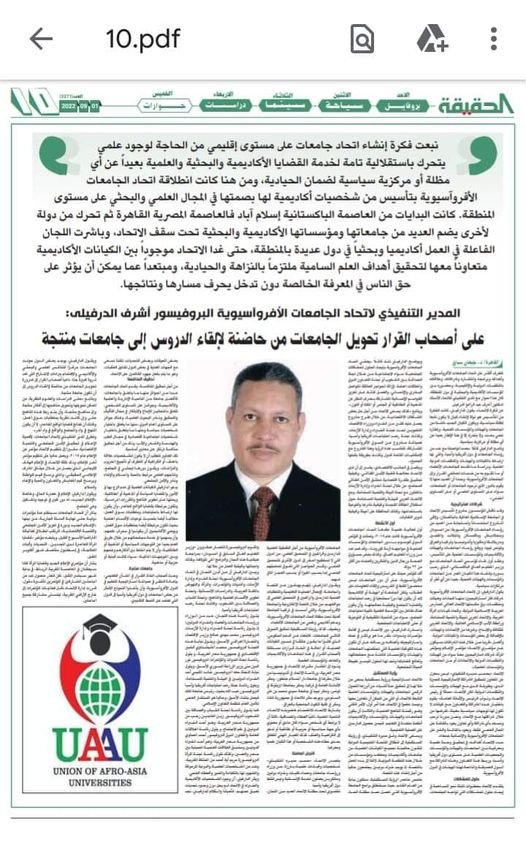Professor Ashraf El-Darfaili, Executive Director of the Union of Afro-Asia Universities, stated that we are moving steadily to contribute to solving societal problems.
A deep and comprehensive interview I conducted with the Executive Director of the #Union_of_Afro-Asia_Universities, Professor Ashraf Abdel Rafeh Darfil, supported by a full team led by Dr. Magda Mahmoud and edited by fellow journalist Ali Batta, under the supervision of Prof. Dr. Abdel Karim Al-Wazan, with the support of the entire media committee team.
In this interview, Prof. Dr. Ashraf provided clear answers regarding the Union, from its establishment to partnerships, expansion, future projects, and more details that can be found in the interview.
The Union aims to create an independent academic body serving academic and research issues.
The Union is progressing steadily toward contributing solutions to societal issues.
Decision-makers must transform universities from lecture venues into productive universities.
The idea of establishing a regional Union of Universities stemmed from the need for an independent academic entity serving academic, research, and scientific causes, away from any political umbrella or centralization to ensure impartiality. This was the spark behind the launch of the Union of Afro-Asia Universities, founded by academic figures who have made a mark in the scientific and research fields in the region.
The Union began its journey in Islamabad, Pakistan, then expanded to Cairo, Egypt, and continued to grow from one country to another, encompassing many of its universities and academic and research institutions under its umbrella. The active committees started working academically and in research across many countries in the region. Today, the Union stands as a significant academic entity, collaborating with others to achieve noble scientific goals, committed to integrity and impartiality, and steering clear of any influences that may distort the pursuit and outcomes of pure knowledge.
To learn more about the Union of Afro-Asia Universities, its objectives, programs, expansion, partnerships, relations with international and regional organizations, and its presence among academic and research institutions in the region, we conducted this interview with the Union’s Executive Director, Prof. Dr. Ashraf Abdel Rafeh Darfil.
Regarding the idea of the Union, Darfil said, “The founding idea was to create a nucleus for an entity that is not subject to any political umbrella, an entity born from universities, bodies, and scientific institutions with a purely scientific framework. It operates solely within this framework, away from any political centralization.”
He continued, “After reaching out to several university presidents in African and Asian countries, many of which are connected to international scientific bodies and organizations, and studying the services these bodies provide to member universities or what they offer to decision-makers and Afro-Asian communities, we found that many do not fulfill the role expected of them, either academically or in providing services.”
Strategic Partnerships:
The founders discussed the Union’s establishment project at the International Islamic University in Pakistan. The project was well received by many university presidents from Sudan, Bangladesh, Pakistan, Thailand, the Philippines, Sri Lanka, Malaysia, Indonesia, Turkey, Iraq, Tunisia, and Libya, who signed the founding agreement. The first meeting of the Union’s founders was held with the Pakistani Minister of Higher Education, who welcomed the creation of this academic entity that represents universities and scientific institutions, free from any political frameworks or underpinnings.
Darfil stated that the Union of Afro-Asia Universities has many strategic partners, including federations, bodies, and organizations, notably the World Federation of Arab Islamic International Schools, the Arab Women Leaders Union, the Arab Union for Environment and Sustainable Development, the World League of Islamic Literature, and the Arab Union for Culture and Creativity, in addition to other international institutions and bodies.
“Soon, through these partnerships, we will have strategic partners in both the Union’s conferences: the Media Conference and the Women’s Conference. These partners will include international organizations, unions, universities, and scientific institutions,” Darfil added.
The Union, represented by its President, Vice Presidents, and the General Secretariat, carefully selects its partnerships and collaborations with entities that do not have specific political agendas imposed through their association with the Union. “We welcome any partnership or cooperation that benefits the academic field only, and ultimately brings good to Afro-Asian communities and humanity as a whole.”
The Union has set its objectives on achieving scientific and intellectual unity among universities, bodies, scientific institutions, and associations across African and Asian countries, linking this cooperation and partnership with friendly and supportive countries for these entities in Afro-Asian countries.
Solving Problems:
The Union is making steady progress toward contributing to solving societal problems. Darfil elaborates, “The Union of Afro-Asia Universities is dedicated to finding solutions to societal issues, whether social issues through the Committee for Friendship between Peoples or the Committee for International Cooperation and Public Relations, to remove barriers that hinder human and social communication and work to strengthen common human bonds, regardless of sect, denomination, race, language, or color.”
He continued, “The Union also strives to solve economic problems through a project being worked on by many experts and Ministers of Economy, under the Committee of Experts and Crisis Management, as well as the Committee for Monitoring the Needs of Africa and Asia, to formulate a project for the Afro-Asian common market. This vision and project will align with the available capabilities of countries and in a way that is acceptable to all.”



